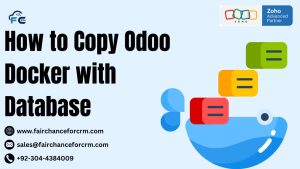Odoo Applications is the our today topic in which we cover all the important aspects and advantages. Odoo is an open-source enterprise resource planning (ERP) software that offers a broad suite of business applications designed to help organizations automate, streamline, and integrate their operations. Known for its modularity and flexibility, Odoo provides a range of applications (apps) that can be used to manage various aspects of a business, such as sales, accounting, inventory, manufacturing, HR, and customer relations.
In this article, we will dive into what Odoo applications are, how they work, the benefits they provide, and a closer look at some of the most popular apps in the Odoo ecosystem.
Also Read:
- Exploring Odoo Apps By FAIRCHANCE FOR CRM
- Understanding Odoo License By FAIRCHANCE FOR CRM
- Odoo Immobilisation (Asset Management) By FAIRCHANCE FOR CRM
- Odoo Framework By FAIRCHANCE FOR CRM
- Odoo Editions By FAIRCHANCE FOR CRM
What Are Odoo Applications?
Odoo applications (or “apps”) are individual modules that make up the Odoo software platform. Each app is designed to perform a specific business function and can be integrated with other apps to create a customized, all-in-one solution for businesses of all sizes. These apps can be installed and configured based on the specific needs of a business, making Odoo highly adaptable.
Odoo applications are categorized into several areas based on business functions. Whether you are looking to manage your financials, streamline operations, handle customer relationships, or build an e-commerce website, there is likely an Odoo app designed for that purpose.
Types of Odoo Applications
Odoo offers a wide range of applications that cover virtually every aspect of a business. These applications can be divided into several broad categories:
1. Core Business Applications
These are the fundamental applications that every business needs to operate effectively.
- Sales Management: Automates sales processes, from lead generation to customer billing. Key features include generating quotations, managing sales orders, and creating invoices.
- Purchase Management: Handles procurement activities, such as managing suppliers, creating purchase orders, and tracking deliveries.
- Inventory Management: Manages stock levels, warehouse operations, and product movements. Key functionalities include real-time tracking, inventory valuation, and warehouse management.
- Accounting: Provides tools for managing financial transactions, such as invoicing, accounting entries, bank reconciliation, and generating financial reports (balance sheets, profit & loss).
2. Customer Relationship Management (CRM)
The CRM application helps businesses manage customer interactions and sales processes more effectively. With the CRM app, companies can:
- Track leads and opportunities
- Monitor customer communications and activities
- Automate follow-ups and lead assignments
- Integrate with marketing and sales apps for a 360-degree view of customer interactions.
3. Human Resources (HR) Applications
Odoo provides a suite of HR-related applications to manage employee records, payroll, attendance, and recruitment. Key apps in this category include:
- Employee Management: Store employee details, contracts, and leave requests.
- Payroll: Automate payroll calculations and generate payslips.
- Recruitment: Manage job postings, applications, and the hiring process.
- Time Off Management: Track employee leaves, vacations, and attendance.
4. Manufacturing
Odoo’s Manufacturing apps help businesses in production and assembly operations manage processes efficiently. Some of the key features include:
- Bill of Materials (BoM): Define and manage the components needed for production.
- Work Orders: Create and manage work orders for manufacturing operations.
- Routing: Manage production routing, helping businesses optimize production flow.
- Manufacturing Execution: Monitor real-time production processes and progress.
5. Project Management
The Project Management app allows businesses to plan, track, and collaborate on projects. Key features include:
- Task Management: Assign and track tasks, set deadlines, and manage workloads.
- Project Milestones: Define and track milestones to measure progress.
- Collaboration Tools: Share files and communicate with team members within the app.
- Gantt Charts: Visualize project timelines and dependencies for better planning.
6. Website & E-Commerce
Odoo provides apps for businesses to create and manage their websites, blogs, and online stores. The key features of these apps include:
- Website Builder: Drag-and-drop interface for building a fully functional website without coding.
- E-commerce: Sell products online with integrated product catalogs, payment gateways, and order processing.
- SEO: Optimize website content for search engines to attract more traffic.
- Customer Portal: Provide customers with access to their orders, invoices, and support tickets.
7. Marketing Automation
Odoo includes powerful marketing apps to help businesses generate leads, nurture prospects, and automate marketing campaigns. Some important marketing features include:
- Email Marketing: Create and send personalized email campaigns to prospects and customers.
- Marketing Automation: Automatically trigger actions based on customer behavior (e.g., follow-up emails, discount offers).
- Lead Scoring: Automatically score leads based on their engagement level to prioritize follow-ups.
- Campaign Reporting: Track the performance of campaigns and improve strategies.
8. Point of Sale (POS)
For retail businesses, the POS app helps manage sales transactions in-store. Features include:
- Offline Mode: Continue to sell even when the internet is down.
- Multi-Device Support: Use various devices like tablets or touch screens for POS.
- Customer Management: Store customer information and track sales history.
- Payment Integration: Accept various payment methods such as cash, cards, and mobile payments.
Benefits of Odoo Applications
- Modularity: Odoo’s modular design allows businesses to pick and choose the applications they need. Whether a business requires a full-fledged ERP system or only specific apps, Odoo can be customized accordingly.
- Seamless Integration: All Odoo apps are designed to work together, which ensures that data flows seamlessly across different business functions. For example, sales and accounting apps are integrated, allowing businesses to generate invoices from sales orders.
- Customization: Odoo applications are highly customizable. Businesses can configure the apps to meet their unique workflows, and developers can extend functionality using Odoo’s open-source codebase.
- User-Friendly Interface: Odoo offers a simple and intuitive interface, making it easy for businesses to adopt the system without extensive training or technical expertise.
- Cloud and On-Premise Deployment: Odoo apps can be hosted on Odoo’s cloud platform or deployed on-premise, giving businesses the flexibility to choose the best option for their infrastructure.
- Scalability: As businesses grow, Odoo allows them to scale by adding more users, apps, and features. Odoo apps are designed to handle both small businesses and large enterprises.
- Cost-Effective: Odoo provides both free and paid versions of its apps. Small businesses can start with the open-source Odoo Community edition and later upgrade to the paid Odoo Enterprise version for additional features and support.
Conclusion
Odoo applications provide businesses with a comprehensive suite of tools to manage every aspect of their operations, from sales and marketing to finance and human resources. The modular nature of Odoo means that businesses can select the apps they need, ensuring that their system is tailored to their specific requirements.
Whether you’re a small startup or a large corporation, Odoo’s wide array of applications can help you automate processes, improve efficiency, and ultimately drive growth. The flexibility, scalability, and ease of integration offered by Odoo make it one of the leading ERP solutions available today.
For more information about the Understanding Odoo Applications, visit this link.
If you want to Free Trail Zoho, click on this link.




